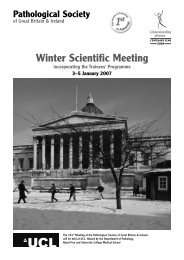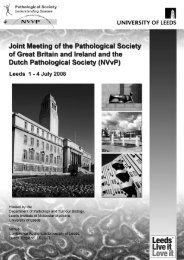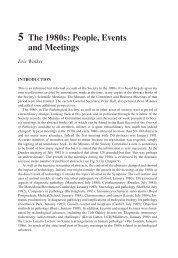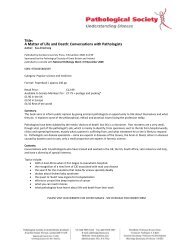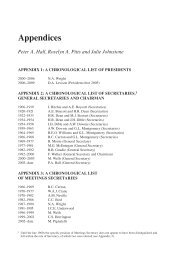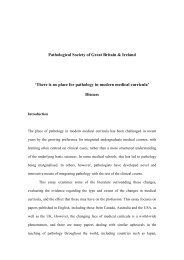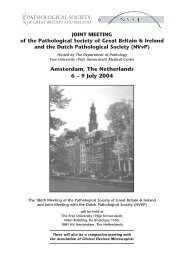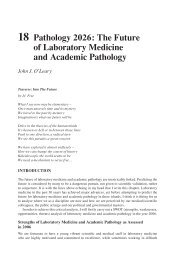Winter Meeting 2011 - The Pathological Society of Great Britain ...
Winter Meeting 2011 - The Pathological Society of Great Britain ...
Winter Meeting 2011 - The Pathological Society of Great Britain ...
Create successful ePaper yourself
Turn your PDF publications into a flip-book with our unique Google optimized e-Paper software.
P49<br />
An Analysis <strong>of</strong> Microsatellite Instability in Colorectal Cancers<br />
Using Immunohistochemistry for DNA Mismatch Repair<br />
Deficiency<br />
P C Lelonek; D Kevan; V Howarth; RJ Hale<br />
Stepping Hill Hospital, Stockport, United Kingdom<br />
According to the WHO, 100 new cases <strong>of</strong> colorectal cancer are diagnosed per day in<br />
the UK. Lynch syndrome is the most common form <strong>of</strong> hereditary colorectal cancer and<br />
around 90% <strong>of</strong> these cancers exhibit microsatellite instability (MSI). 5-FU is the mainstay<br />
chemotherapeutic agent used for treatment and there is evidence that cancers with a<br />
defective mismatch repair system do not benefit from 5-FU. <strong>The</strong>refore testing for MSI<br />
could be used to determine whether 5-FU chemotherapy would be effective.<br />
<strong>The</strong> aim <strong>of</strong> this study was to determine if testing for MSI in right sided colonic cancers<br />
was simple, reproducible and cost-effective in a DGH setting and possibly across the<br />
region.<br />
A total <strong>of</strong> 204 patients with right-sided tumours, which were ‘poor prognosis’ Dukes’<br />
B (extramural venous invasion or serosal involvement) or Dukes’ C, were identified.<br />
Tumour sections from each case were stained with antibodies against MLH1 and<br />
MSH2. Intensity <strong>of</strong> immunoreactivity and percentage positivity was recorded and a<br />
semiquantitative score was given for each slide.<br />
<strong>The</strong>se antibodies were found to be easy to use, clean staining, and easily interpreted.<br />
<strong>The</strong> cost per slide for each antibody was £11.02 for MLH1 and £12.11 for MSH2.<br />
When comparing MSI high and microsatellite stable tumours, a number <strong>of</strong> prognostic<br />
variables were found to be statistically significant. <strong>The</strong>se included: tumour differentiation<br />
(p=



